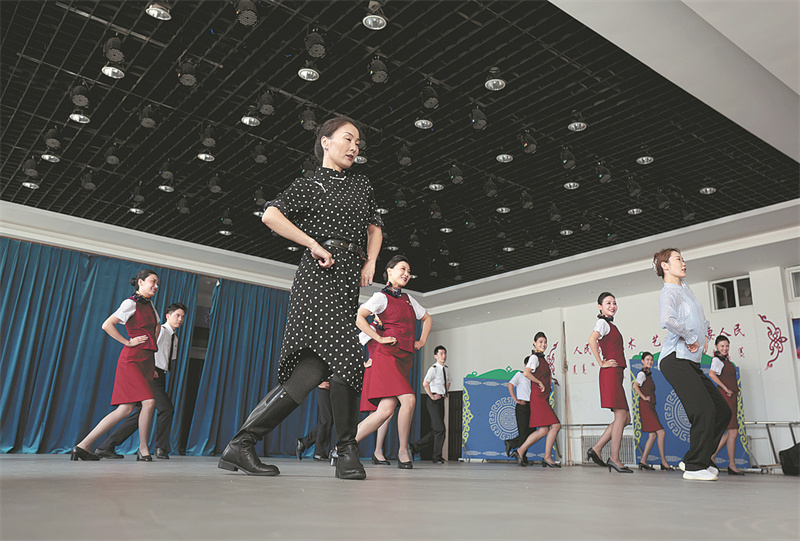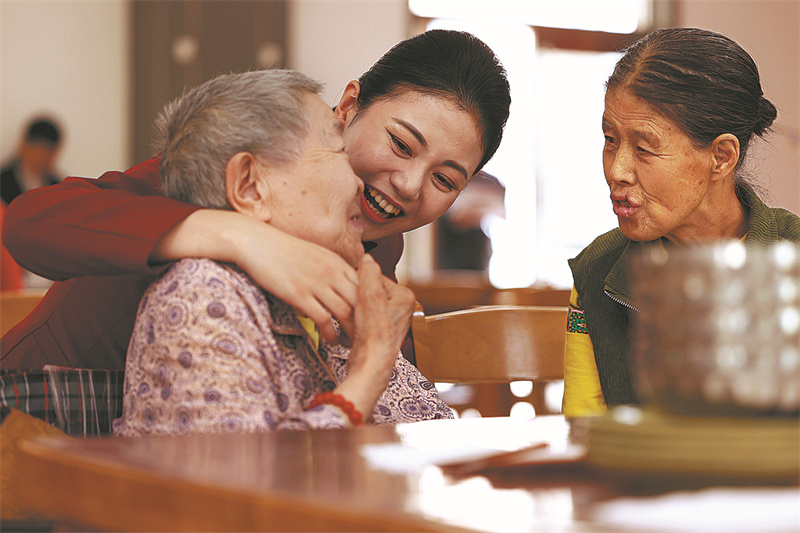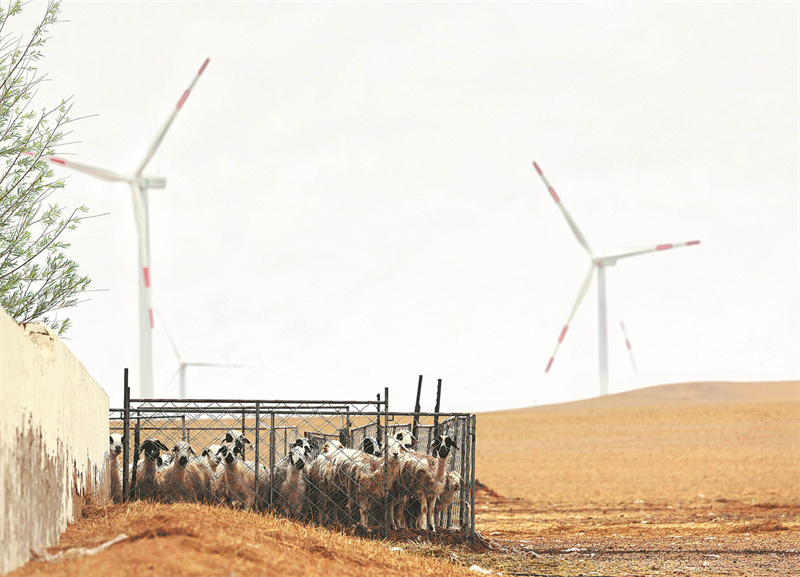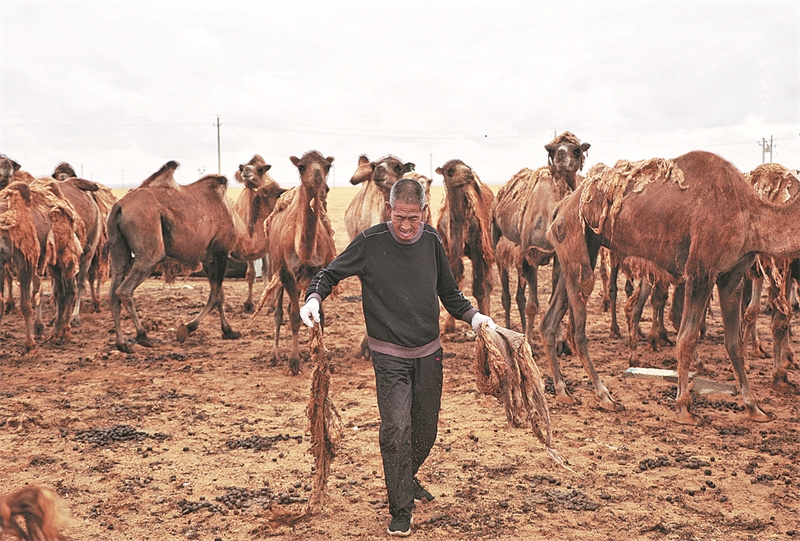Rural vitalization program flying high with Air China

Members of Ulaan Mochir, a renowned Mongolian music and dance group, teach a local dance to Air China cabin crew members on July 13. TAO RAN/FOR CHINA DAILY
Company is investing in both facilities and the local people. Luo Wangshu reports from Sonid Right Banner, Inner Mongolia autonomous region.
Duan Changming has been working as a street cleaner in a village in North China's Inner Mongolia autonomous region since 2019.
Every year, the 55-year-old, who once lived in poverty, receives a stipend of 7,200 yuan ($990) for doing the work.
The money comes from a photovoltaic power station in Sonid Right Banner, a county-level area in the region, which was once classified as impoverished.
The power station was a poverty alleviation project operated by the local authorities, but it is currently being upgraded to a rural vitalization program.
The facility, which covers 20 hectares, stands on land provided by 34 villages that were once officially classified as poverty-stricken. Total investment in the station was about 50 million yuan, with about 12 million yuan coming from China National Aviation, a State-owned enterprise that is the parent of Air China, the national carrier.
Construction of the station began in September 2018 and was completed the following December. Now, the electricity it produces is sold to a local electric company and the profit is distributed among the 34 villages.
As of April, the station had generated a profit of 10.12 million yuan, and after the money had been divided, each of the 34 villages set up charitable posts, such as street cleaning jobs, and hired impoverished local residents, who each receive a stipend, according to Guo Mu, director of the banner's development and reform commission.

A crew member greets a senior in Sonid Right Banner, Inner Mongolia autonomous region. TAO RAN/FOR CHINA DAILY
Sustainable measures
"To ensure the assistance is sustainable, we do not give money or livestock directly to the villagers. For example, if an idle person were given some cows and sheep, they might choose to sell or eat them, which is not a sustainable way to help the villagers have a better life in the long term," Guo said.
"The villagers can decide how to spend the money and the priorities to boost the village's development. For instance, some villages use the cash to improve the infrastructure and build roads. Wind and solar resources are natural gifts for local people, and as China is developing the new energy sector, we can better use these resources," he said, adding that animal husbandry, the main local industry, is risky due to the elements and bad weather.
"It's a business that's mainly dependent on the climate, but photovoltaic power can generate profits all the time. It is the future."
Duan, the villager, said, "I'm grateful to the preferential policy for offering me a better life."
His village, Dukhum in Saikhantal township, has 12 charitable posts, including street cleaners and garbage truck drivers. Each worker receives a stipend of 600 to 1,000 yuan every month, said the village head, Amgalan, who, like many people from the Mongolian ethnic group, only uses one name.
"Our village began receiving the money earned by the photovoltaic power station in 2019. The income is mainly used to pay stipends for the charitable posts, set up funds to assist villagers who are in difficulties and prevent them from slipping back into poverty, developing the collective economy of the village, offering subsidies to help residents who have serious illnesses and improving the environment," Amgalan said.
Last year, the village allocated a total of 12,000 yuan to four sick villagers. This year, a severe drought has affected the herders' livelihoods, so 38,000 yuan has been allocated to 19 households that have been badly affected.
"The money from the power station is not only improving the village's collective economy, but is also playing an important role in raising herders' incomes, preventing villagers from slipping back into poverty, ensuring people's livelihoods and improving their living environment," Amgalan said.
The photovoltaic power station program is just one of many rural vitalization projects in the banner that are sponsored by China National Aviation.

Sonid sheep stand in a pen at a breeding station that was built as part of a paired-assistance program by Air China. TAO RAN/FOR CHINA DAILY
Paired assistance
To win the battle against poverty, SOEs have been paired with impoverished areas to help them become wealthier. For example, Air China established a paired-assistance relationship with the banner in 2012, and helped eradicate local poverty in April 2019. Since then, the company has continued to help the area remain free from poverty and helped carry out a rural vitalization campaign.
Over the past 11 years, the company has provided 95 million yuan as free assistance funds to the banner. Meanwhile, its employees have spent more than 178 million yuan to purchase and sell agricultural produce in the assisted areas.
The company has also helped governments train technical talents and set up a tailored hiring program for local people. Since 2016, the company has sent three employees to be deputy heads of the banner — usually serving two-year terms — who are mainly in charge of local poverty alleviation and rural vitalization programs, and also serve as liaisons to link outside resources with the area.
In addition, employees such as flight attendants visit local primary schools to provide aviation safety classes.
Livestock is the region's pillar industry, and Sonid Right Banner is famous for its mutton, beef and camel's milk. Air China has assisted the local people and government in breeding the cattle, improving husbandry technology and promoting the brand. In 2019, the company invested 3 million yuan to build a Sonid sheep breeding base at Ursheelt, a village in Ereennuur township.
By the end of last year, 646 villagers from 248 households had benefited from the base, earning a combined income of 645,000 yuan.
Moreover, the company invested a further 2.5 million yuan last year to upgrade the facilities and equipment at the base, and promote scientific breeding strategies.

A villager collects fur shed by Bactrian camels. TAO RAN/FOR CHINA DAILY
Breeding stations
In 2020, Air China invested 7 million yuan to build a second station to breed Sonid sheep, balance environmental protection, conduct research on new technologies and improve the breed's reproduction rate by 15 percent.
A large number of professionals have been trained at the farm, boosting the development of regional agriculture and animal husbandry.
In addition to sheep, Sonid Right Banner has a tradition of raising camels, and Air China invested 8 million yuan to build a Bactrian camel breeding center. At its peak, the center had 400 camels. Last year, it produced 46 metric tons of camel milk.
Buyankheshig, head of Rashaant village, said the settlement earned about 1 million yuan last year by breeding livestock, including sheep, cows, horses and camels, and more than 200,000 yuan from raising camels.
"The camel is a sensitive animal. For instance, only its keeper can milk it: if a stranger tries to milk it — sorry, no milk today," he said, adding that experienced keepers sometimes sing to the camels to make them happy so they will produce better milk.
It's a profitable business, as a 900-gram tin of camel milk powder sells for more than 900 yuan, three times that of regular milk powder.
Buyankheshig added that breeding camels is more profitable than raising sheep, so more villagers are interested in participating.
Bol, 22, who graduated in veterinary science at a vocational school, is learning how to breed camels as his family plans to buy some of the animals and join the business.
Saintsogt, head of Ereennuur, said breeding camels brings a profit of about 13,337 yuan per year, while horses bring 8,550 yuan, cows make 7,771 yuan, and sheep come in at 650 to 1,350 yuan.
"We did the math. The income the herders make from breeding one camel is about the same as from breeding seven sheep. So, to make the same profit, herders have to raise more sheep, which means more pressure on the grassland," he said. "It is more environmentally friendly to breed camels than sheep."
Yuan Hui in Hohhot contributed to this story.



 Print
Print Mail
Mail


